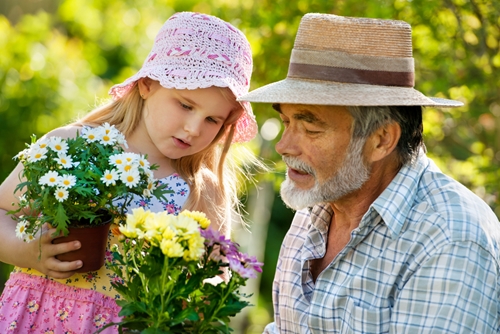Gardening and Mental Health: How it Improves Your State of Mind

This may be a no-brainer, but the more physical activity you do throughout your life, the better you will feel. Gardening and Mental Health go hand-in-hand for a reason. According to the American Heart Association, physical activity can relieve anger, depression, anxiety and tension, making it one of the best methods to boost senior mental health and physical well-being. While many seniors may walk, jog, swim or participate in exercise classes to stay fit, gardening is another popular activity that can be part of a healthy lifestyle throughout senior retirement and improve your state of mind.
Gardening and Mental Health Go Hand-in-Hand
Gardening is one of the best ways to move your arms, legs and joints, as you will need to bend, dig and kneel. The Centers for Disease Control and Prevention recommends gardening as part of a regular fitness routine, noting that active seniors are less likely to be affected by chronic illnesses such as diabetes, obesity, high blood pressure, heart disease and stroke.
If you’ve been inactive for some time and want to improve your senior fitness level, it can be a good idea to start slowly with gardening, with just a few minutes of activity per day and gradually building up to longer periods. As gardening is typically an outdoor activity – though you might have an indoor greenhouse – you should be mindful of the temperature and your physical limits in heat, as well as remember to stay hydrated.
Gardening and nutrition
If you grow your own vegetables and herbs, it may seem like better senior nutrition is a natural progression. Compared to other age groups, seniors are at a higher risk of developing diseases with poor nutrition. While eating right can sometimes be a challenge, gardening can actually encourage you to eat better – especially if you are growing healthy vegetables and plants you can consume.
According to a recent study by Texas A&M and Texas State University, gardening contributes to a better quality of life, and seniors who participate are more likely to be healthier and exercise more. The study found that nearly twice as many gardeners considered themselves to be “very active” compared to non-gardeners. While digging in the dirt a few times a week won’t constitute a full workout, it can be an integral part of living an overall healthy lifestyle.
Hobby or passion, but not a chore is why gardening and mental health compliment each other
To keep your garden a sanctuary and fun activity rather than a chore, it’s important to think of it as a hobby. Weeding can be a pain sometimes, but you should try to enjoy the experience of getting your hands dirty, being outside and watching your hard work come to life. In this case, you can literally reap what you sow. Gardening can keep you busy during senior retirement and could even be a gateway into a new community of others who are passionate about plants.
“In a time when older adults are living longer and enjoying more free time, gardening offers the opportunity to fulfill needs created by changing lifestyles,” said Aime Summerfield, a researcher with Texas A&M and Texas State University who conducted the study. “Gardening provides participants with opportunities to reconnect with themselves through nature and a healthy activity to enhance their quality of life.”
How you can get started
If you’re new to gardening, you may not know where to begin. Here are some tips to get started:
- Choose your spot: If you live in a city or in a rental building, finding a place to garden is more of a challenge, but you may be able to find community plots or indoor options in your home. If you have a yard, you can easily get going by picking a sunny spot to put your garden.
- Get the supplies: Gardening supplies are relatively inexpensive and you can find them at specialty shops and home improvement stores. You will most likely need a pair of gloves to protect your hands, good soil for growing and tools like a hoe, hand trowel and digging fork to help get through weeds, roots and rocks.
- Clear your yard: Before you can plant anything, clear away debris and leaves from your garden plot.
- Start indoors: Picking out which plants you want to grow is perhaps the most fun part of starting your garden, but you should carefully read through instructions if you’re beginning with seeds. In some cases, you may want to start indoors with seedlings before planting outside.
To maximize your Senior Health Insurance benefits, visit MySeniorHealthPlan.com for quick, simple and easy information.
- How Medicare Advantage Plans Cover Seniors’ Vision, Hearing, and Dental Needs - October 29, 2024
- 2025 Medicare Part D Changes: How to Save on Prescriptions - October 25, 2024
- Everything You Need to Know About the 2025 Medicare Changes and How They Affect You - October 21, 2024

